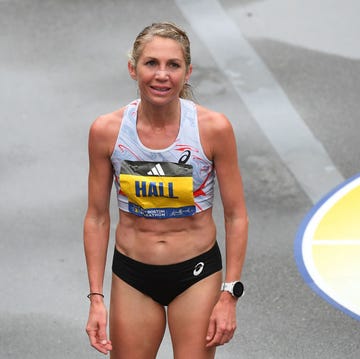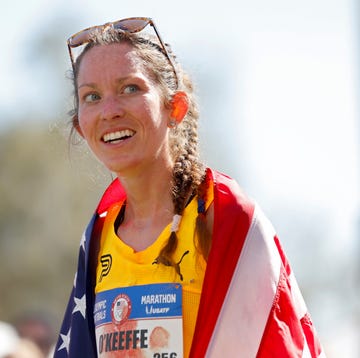When Simone Biles pulled out of the Tokyo Games, the four-time Olympic gold medalist made a brave decision that shocked the world. On sports' biggest stage, the gymnastics champion cited mental health challenges as the reason why she withdrew from the meet while it was underway.
In subsequent interviews, Biles shared that she went to therapy in an effort to heal from years of sexual abuse at the hands of former USA Gymnastics doctor Larry Nassar and how the coping mechanisms she learned in therapy weren't enough to overcome the “twisties” (when an athletes' mind and body lose connection and muscle memory fails to kick in) mid-competition. New York Magazine referred to the decision as Biles “choosing herself,” amid a terrifying mental health setback.
At the time, it was exactly what professional sprinter Jasmine Blocker needed to hear.
For several months, the Princeton graduate who also works as a personal trainer had been dealing with her own mental health challenges, which kept her from competing at the 2020 U.S. Olympic Track and Field Trials earlier that summer. As Blocker shared, her generalized anxiety disorder, complex post-traumatic stress disorder, and depression had worsened throughout the pandemic. When she watched Biles prioritize her mental health, Blocker realized she also needed to take action for herself. “It wasn't until that happened that I was like, this is a real thing,” Blocker told Runner's World. “Hearing [Biles] say 'it's a safety issue. I'm not going out there because my head isn't right,' made it a real thing. You have to take steps and you have to do things differently.”
In August 2021, at the recommendation of her therapist, Blocker enrolled in a partial hospitalization program, a structured mental health treatment program that runs for several hours each day, three to five days per week. For five months, the world relays champion underwent treatment to address mental health setbacks. With the help of intensive therapy techniques, Blocker has emerged stronger amid the healing process and become a fierce The NCAA Runner-Up Finished 2ndWith One Shoe. During Mental Health Awareness Month, Blocker shared the highs and lows of her journey and tips to help others put their mental health first.
When the usual coping mechanisms aren't enough
Since middle school, Blocker has managed social anxiety and depression, coping with the conditions through therapy, journaling, and meditation, among other tactics, she said. But when the pandemic hit and she was faced with a lack of structure, cancellations, and uncertainty, things started to “unravel” for the Olympic hopeful. “You're in survival mode and you're grinding and you're grinding and you're figuring it out and you're figuring it out. But you can't realistically spend years and years like that,” she said.
Although she qualified to compete in the 400 meters at the Olympic Trials, Blocker reached a point where she was afraid of having a panic attack at the championship in Eugene, Oregon. “In the world of athletics, your mental health is a really big secret because you don't want anyone to think that you're weak, you don't want any targets on you,” she said. “You want to make it look easy and appear flawless. You want people to count on you.”
Over time, she started experiencing daily suicidal ideations and physical symptoms of depression, including feelings of sickness, and her usual coping mechanisms were no longer helping her, she said. Ultimately, Blocker decided it was best for her to stay home in Los Angeles last summer.
“It wasn't a true safety issue until last year,” she said. “As much as I don't want to talk about that, I think that's the biggest piece of this. It's a safety issue for a lot of people, and I think it needs to be taken very seriously. That was the biggest difference. It was less of a chronic depressive state and more of a sense of urgency at the time.”
Going to a place of healing
About a week after watching Biles withdraw from the Olympics, Blocker went to a pivotal therapy session, where her therapist suggested a partial hospitalization program. At first, Blocker was afraid, not knowing the difference between a partial hospitalization program and a psychiatric hospital, she said. But after careful consideration and research, she decided the program, which allows attendees to leave at their choosing, was the right step for her to take at the time.
“If you are drowning, it's difficult to maintain your day to day life and give a hundred percent to healing and getting better just depending on where you're at,” she said. “Something that my mom always said to me is 'You can't heal where you got sick,' and that was one of the reasons I left. I could always find something else to do that was not getting me better.”
Blocker found a program that was not only covered by her insurance, but that offered support and services which resonated with her needs. For four months, Blocker chose to live at the facility and receive therapy treatments five days a week. During the weekdays, she'd attend group and one-on-one therapy sessions, receive acupuncture, and do yoga, sound baths, and dance therapy, among other forms of treatment. While she was resistant at first, Blocker eventually became more engaged in treatment over time, she said. “It feels hard because it is hard and that's not to say that you can't do it or you're doing it wrong, but what you're feeling is work that you should be proud that you're doing,” she said.
Blocker credited being present and noticing small, gradual progress points over time as the factors that helped her become more open-minded to healing. She also underwent a trial and error process to determine which medications work best for her.
In her last month of treatment, Blocker went to the facility three days each week, going home and training in between sessions. After she left the program, she picked a few therapy treatments that resonated and continues those sessions today.
Embracing treatments that work best for the individual
Since leaving the program in February, Blocker has continued to utilize talk therapy, acupuncture, sound baths, yoga, and hard exercise as key ways to help her cope with depression. That's also where running comes in.
“It's that feeling of being powerful and explosive and feeling very free and also competitive,” Blocker said. “Everyone wants to make it so that nothing is a competition and everything is fine. I think it's okay to feel some fire and be like, no, I'm about to go kill this right now. You don't have to be this even-keel, balanced thing. Feel the full range of your emotions. That is how you lift yourself out of depression, you feel everything, see everything, you're just present.”
In late April, Blocker returned to competition and ran a personal best in the 100 meters. So far, she has finished five races and paced one event, according to World Athletics. For Blocker, being a professional runner also offers an important outlet that allows her to compartmentalize different areas of her life. “You need a break from your own mind, which is such a weird thing to say, but it's so true, like there's something so great about going to the track and I'm just worried about running track. That's it,” she said. “That's something my coach would often say to me, 'When you enter that gate, you leave everything else out there and you just come in here with a blank slate.’”
Looking back on her experience in the partial hospitalization program, Blocker said she's learned how to not “take everything so seriously.” She's let go of some of her perfectionist tendencies and changed how she processes failure. “A lot of what took me to that place was that I wasn't just scared to fail, it was actually described to me by my therapist as 'intolerable' for me, like I would feel real pain,” she said. “So, I think just taking it a little bit easier. It's really just life and it's going to be alright.”
Jasmine's recommendations for putting mental health first
1. It starts with reaching out for help. Blocker recommends shopping around to find a therapist you can trust and feel comfortable opening up to. “That's your starting block,” she said. “I think that people really overlook that step. They go straight to medications. They're not thinking about talking to someone on the regular, them getting to know you, and using that clinical experience to help you along. That's really important.”
2. Mental health is an ongoing process that takes time, and it's not always a “straight slope upward,” Blocker said. “Just because you are doing better, doesn't mean you won't have points where you are feeling those same feelings when you were very low,” she said. “However, you will be there for a shorter amount of time, you might have different tools. You just have to expect that the road will be bumpy.”
In acknowledging the imminent challenges, Blocker also pointed out the importance of acknowledging the work being done to prioritize your mental health. “You're going to continue to ascend even if you come back down for a minute, that's alright,” she said. “You can make your way back up and then some. It's all good.”
3. Don't feel guilty about putting your mental health first. “I think there's this idea around how being grateful enough for what you have should somehow sustain your mental health as though if you were only grateful enough, you wouldn't be depressed, which is not true,” she said. Blocker recommended removing that “weight” and making the investment in mental health without feeling any shame.
“Gratitude is great, but I feel like it's holding people back from getting the help they need,” she said. “Have some grace for yourself. We're all doing the best that we can. If you need extra help, that's not a character flaw. We all need help.”
Taylor Dutch is a writer and editor living in Austin, Texas, and a former NCAA track athlete who specializes in fitness, wellness, and endurance sports coverage. Her work has appeared in Runner’s World, SELF, Bicycling, Outside, and Podium Runner.















